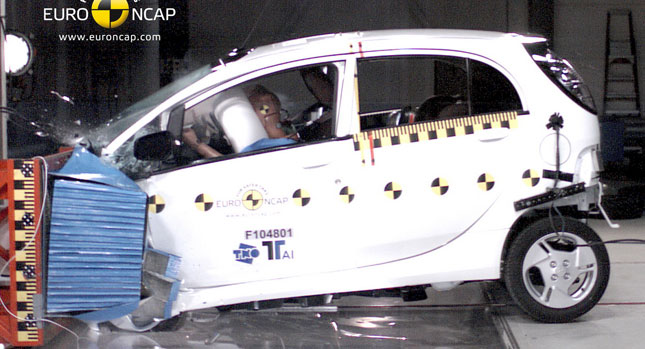The Mitsubishi i-MiEV is the first ever plug-in electric vehicle to be tested by Euro NCAP and marks the start of a series of EV crash-tests planned for this year. Besides the i-MiEV, the European safety institute also rated five conventional models: the BMW X1, Hyundai ix20, Dacia Duster, Mitsubishi ASX and Nissan Juke.
The EV obtained an overall four star rating, the same score being awarded to the i-MiEV’s sister models, the Citroen C-Zero and Peugeot iOn, which have the same design and safety equipment. The result was judged as “creditable” by the Euro NCAP.
“We recognize the efforts done by Mitsubishi to demonstrate that plug-in battery powered cars can be as safe as others. It shows that a future 5 star accolade for EVs is not unthinkable,” said Dr. Michiel van Ratinge, Euro NCAP’s secretary general.
The testing procedure was similar to the that for conventional cars, with special attention being given to the battery integrity after the crash and the functioning of the battery cut-off switch, which isolates the high-voltage battery in the event of a crash. Fortunately, no electrical or fire hazards were detected during the testing of the i-MiEV.
The other cars tested were all rated with five stars, with the exception of the Dacia Duster. The small off-roader achieved an overall rating of three stars, because of scoring only 28% in pedestrian protection and 29% for safety assist. However, protection offered to adult passengers was better in the Dacia than in the Mitsubishi i-MiEV (74% vs. 73%), while child protection was at the same level (78%).
“It is disappointing that a mother company like Renault does not give safety the same priority in Dacia cars as it does in cars sold under its own brand”, concludes the Euro NCAP press release.
By Dan Mihalascu



























